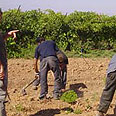
Abd al-Majid Salem, one of the farmers, said "I saw the settlers digging diligently and soldiers were securing them. When we asked the soldiers what was going on they answered that there was a festival and told us to go away. I told them that it was our land but they wouldn't listen and said it was land that belongs to the government."
Salem said that following the incident he was asked, along with the other farmers, to prove to the Civil Administration that they indeed owned the land.
"This is not the first time that they have planted trees on our land at this time of the year. They've done it in the past. Then we have to go and prove that the land that we have been working for decades is ours," he said.
During the incident neither the settlers nor the soldiers were violent towards the Palestinian farmers. The farmers turned to Zacharia Seeda, a coordinator from an organization called Rabbis for Human Rights who contacted the army, asking them to stop the activities.
"I got no response from the army, and I'm worried that the hole digging will be followed by tree planting soon, making it a fait accompli, damaging the local farmers' rights and their ownership of the land," said Seeda.
'Israel making life easier for settlers'
Rabbis for Human Rights said that the tree planting is contrary to a resolution of the Judea and Samaria Appeals Committee that determined that most of the farm land in the region belongs to farmers who had already gone to court against the supervisor of governmental property.
The farmers said that many of the holes were dug in areas that were specified in the appeal and they were not confined to areas where the land had been expropriated in 1967.
Abd al-Haadi Hankash, from the Committee for Protection of Palestinian Land in the Hebron Region, said that expropriating the lands was meant to create a reality where the Green Line is repositioned deeper in Palestinian land.
Hankash said that the Israeli policy was to make life easier for the settlers by creating a territorial continuity and the Palestinian farmers were paying the price of ownership to their land.
The IDF responded by saying that the area in question belongs to Meitarim, an industrial area belonging to the state. According to IDF the Palestinians appealed that in 1982 and lost, and since then there has been no dispute about the land. The planting activities were authorized by IDF and the infrastructure department of the Civil Administration.















